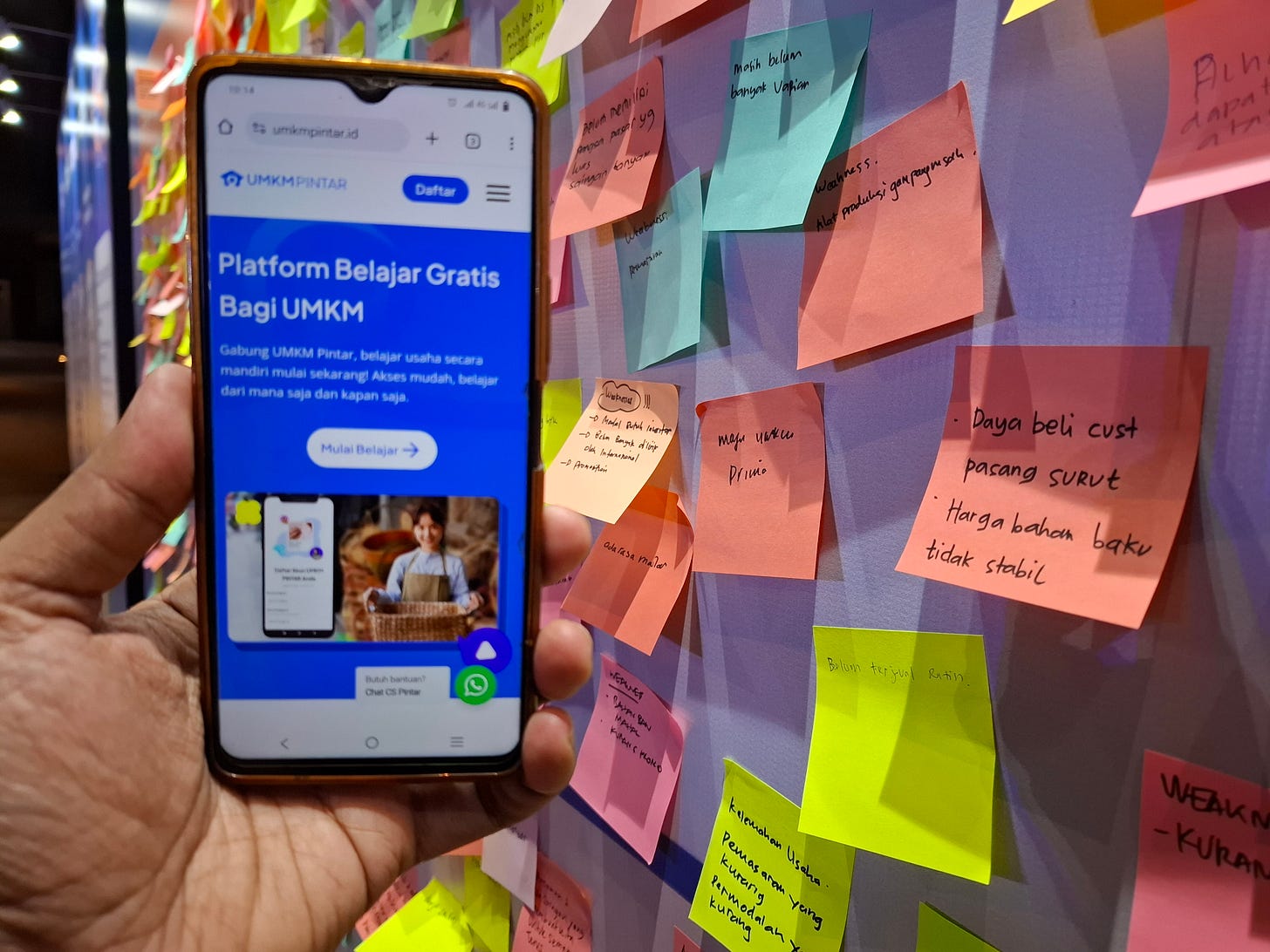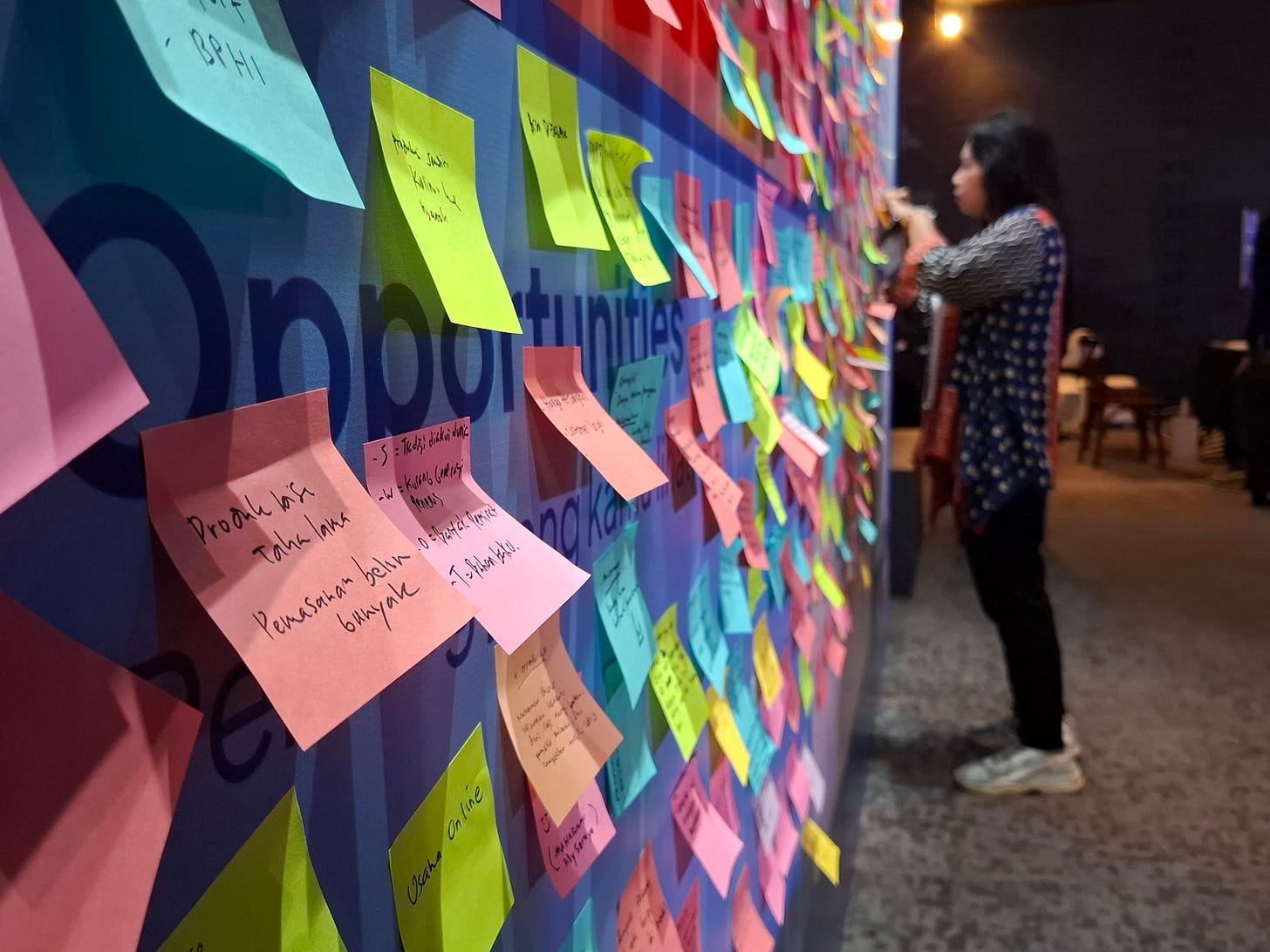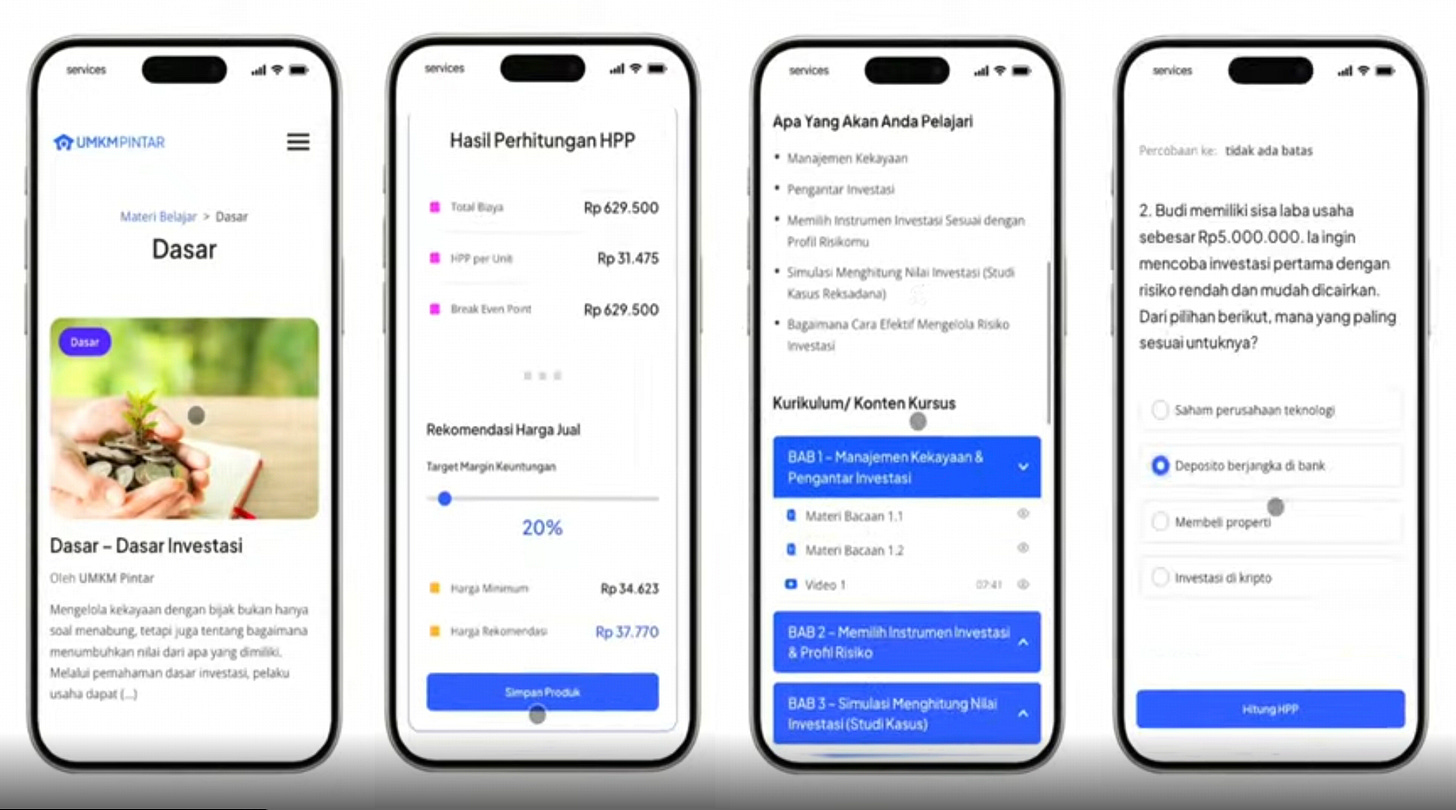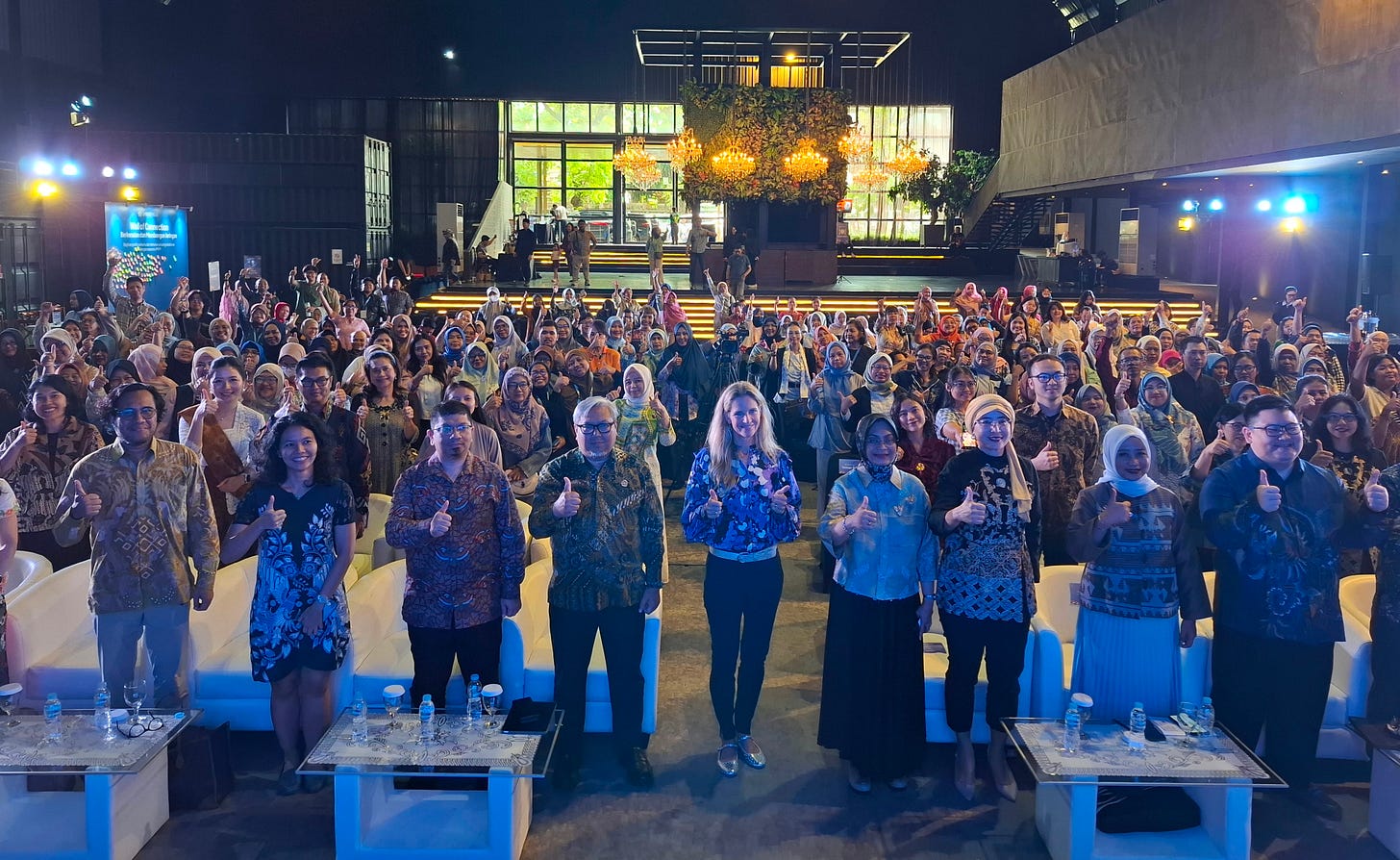💼📊Where do Indonesia’s MSMEs stand in financial literacy?
SeaBank offers a digital learning platform to improve MSMEs’ financial literacy

The Main Takeaway 🎯
A 2025 survey by OJK and BPS found that 66.46% of Indonesians are financially literate (up from 65.43% in 2024), and Women have slightly lower financial literacy (65.58%) than men (67.32%).
To boost financial literacy among Indonesians—especially women running MSMEs—SeaBank Indonesia and Women’s World Banking launched a digital platform called UMKM Pintar on Thursday (11/20) in Jakarta.
The platform helps improve financial skills, boost financial security, support MSME growth, and accelerate business digitalization.
Why It’s on Our Radar 🔍
Population increase: According to the Home Affairs Ministry, Indonesia’s population in the first half of 2025 reached 286 million, with women making up about half (142 million).
Growing labor demand: As of August 2025, Indonesia employed 146.54 million people—up 1.9 million from the previous year. Women made up 56.63 million of the workforce, including those working in MSMEs. (BPS)
Low digital adoption: OJK also reported that Indonesia had 65.5 million MSMEs in 2025, of which 64% were run by women. However, only 25 million MSMEs have joined digital platforms, particularly e-commerce platforms.
“This shows that women are the backbone of Indonesia’s economy, especially for families in our communities. The problem is that women’s knowledge of how to manage and use finances is still limited.” Amurwani Dwi Lestariningsih, Deputy for Gender Equality, Ministry of Women’s Empowerment and Child Protection.

Why It Matters ⚠️
MSME contribution: MSMEs remain the backbone of Indonesia’s economy, contributing 61.9% to GDP and employing about 119 million people (97% workforce) in 2025.
MSME challenge: MSME owners still face challenges in managing finances and expanding their businesses in the digital era, including high informality, poor financial records, and difficulty separating personal and business funds.
“This shows a gap in financial literacy, especially in digital finance and formal financial services, which affects the sustainability and growth of women’s businesses.” Junedy Liu, Vice President and Director at Seabank
What’s at Stake ⚖️
Business resilience: Women’s World Banking reported that in 2023, only 44% of women entrepreneurs could keep their e-commerce businesses running for 3–5 years.
Slower growth: Women’s MSMEs often struggle to grow due to limited access to capital and financing, fewer opportunities to improve their skills, as well as multiple roles outside the business.
More vulnerable: without the right skills, women entrepreneurs are more vulnerable to fraud, predatory lending, misinformation, and skill gaps.
Unfair competition: There is a price war on digital platforms, where imported products often offer lower prices and attract more customers than locally produced goods by women’s MSMEs, due to a lack of knowledge or regulation on minimum prices.

The Big Picture 📸
The UMKM Pintar digital platform will offer easy-to-access financial literacy training for women entrepreneurs, including:
Learning materials: Three levels—basic, intermediate, and advanced—available as videos and slides, with quizzes for evaluation and a certificate after completion.
Basic: covers banking basics, business financial management, debt management, and business investment.
Intermediate: pricing products and services, financial records, business legality, and manpower management.
Advanced: risk management, finding new business opportunities, building a brand, and choosing the right sales strategy.
Smart calculator: Helps calculate the cost of goods based on product type, production units, raw materials, packaging, services, and workforce. It also checks an MSME’s financial health by analyzing revenue, costs, profit, debts, stock, equity, liabilities, and assets.
“With proper training, women can do more than just join the digital economy — they can be prepared to handle challenges, take advantage of new opportunities, and strengthen the businesses they create.” Angelique Timmer, Regional Head for Southeast Asia at Women’s World Banking
What to expect?
Through UMKM Pintar, Seabank and Women’s World Banking aim to achieve the following targets:
Equal access: Women gain more opportunities to manage assets, finances, and capital—roles traditionally handled by men.
Readiness: Women entrepreneurs become more independent, confident, and ready to run businesses that bring positive economic impacts to their families and communities.
Sustainable business: helping their businesses stay sustainable, resilient, innovative, able to adapt to rapid technological changes, and able to make the right decisions during uncertainty.
Fair competition: MSME owners, especially women, can improve product quality and competitiveness to match imported goods on digital platforms.
Growing profits: A 2023 World Bank study found that training SME owners can increase their sales and profits by about 10%.
Cross-sector synergy: The UMKM Pintar platform aims to strengthen cooperation between SMEs, banks, the government, and regulators to expand financial literacy and inclusion, and to help develop minimum-price policies in e-commerce.
“We will work with the Trade Ministry to regulate low-cost imported products, especially from China, so they receive fair treatment. We have not set a minimum price yet, but we assure you that we will protect your businesses by ensuring fair rules for products entering the country.” Temmy Satya Permana, Deputy for Small Business at the Ministry of SMEs

Why This Hits Home
Indonesia aims for 8% GDP growth by 2029, and requires 19 million new jobs to achieve this target.
To achieve this, strengthening MSMEs, making them more competitive, and making them more resilient are essential to enabling them to create more job opportunities in the future.
Regional Lens 🌏
MSMEs play a key role in ASEAN’s economic growth, with more than 70 million MSMEs recorded, contributing 44.8% to the region’s GDP in 2024.
Brunei Darussalam:
There were 6,134 MSMEs, employing about 61,000 workers, and contributing 40% to the country’s GDP by the end of 2022.
Authority aims to help 1,200 MSMEs adopt digital technology by 2025.
Brunei Darussalam’s financial literacy rate for 2024 has not yet been released.
Cambodia:
By the end of 2024, Cambodia had nearly 44,000 MSMEs, employing 476,000 workers and contributing 63% of GDP.
Digital literacy remains low, with 32% having basic access, 5% intermediate skills, and 1% advanced skills.
Financial literacy is also low, with only 18% of the population being financially literate.
Laos:
There is no MSME data for Laos in 2024, but in 2020, there were 133,000 MSMEs, employing about 80% of the workforce and contributing 16% to GDP.
Digital literacy is low, with only 43% of the population having internet access due to limited infrastructure and a shortage of trained teachers.
Financial literacy data for 2024 is not available.
Malaysia:
Malaysia had about 1 million MSMEs, employing 48.7% of the workforce, and contributing 39.5% of GDP in 2024.
Less than 40% have advanced digital adoption, while over 60% still use only basic digital tools.
Malaysia’s financial literacy rate also reached 59.1%
Myanmar:
In 2024, Myanmar had about 46,000 MSMEs, employing 97% of the workforce and contributing 30% to GDP.
Digital and financial literacy remain low due to the 2021 coup, internet shutdowns, damaged infrastructure, and the March 2025 earthquake, causing mass displacement.
Financial literacy data for 2024 is not available.
The Philippines:
The Philippines had 1.2 million MSMEs, employing 6.3 million people, and contributing 40% to the country’s GDP in 2024.
The government is implementing the MSME Development Plan 2023–2028 to support digital transition and innovation, helping MSMEs improve efficiency, cut costs, reach new markets, and enhance customer experience.
Financial literacy in the Philippines remained low in 2024, with only about 25% of adults being financially literate, due to poverty, inequality, limited access to financial services, and cultural factors.
Singapore:
Singapore has about 352,000 SMEs, employing nearly 2.5 million people, and contributing around 47% of GDP in 2024.
About 95% of these SMEs have adopted digital transformation, including AI.
Singapore’s financial literacy rate reached 55.2%.
Thailand:
Thailand had about 3.2 million MSMEs, employing 13.4 million workers and contributing 34.9% to the country’s GDP in 2024.
Although nearly 90% of adults shop online and over 60% use digital payments, many Thai MSMEs are slow to adopt digital technology due to limited broadband access and poor internet quality.
Thailand faces financial literacy challenges, with household debt reaching THB 16.42 trillion (88.4% of GDP) in 2024—the highest in Asia. This has pushed the government to strengthen its financial management skills to lower the debt level.
Timor Leste:
No MSME data is available for Timor-Leste in 2024.
About 54.2% of the population uses the internet.
Financial literacy is moderate to low, with over 70% of transactions still in cash due to limited infrastructure and bank access.
Vietnam:
Vietnam had about 921,000 MSMEs, employing over 5.3 million people, and contributing 50% of GDP in 2024.
Digital literacy is low, with 54% of SMEs lacking IT staff. To improve this, the government set up 74,000 digital community groups with 350,000 members nationwide.
Financial literacy is also low, as 67% of young adults feel confused about managing finances, and 33% struggle with investments.
Need more Angles?
ASEAN Development of Micro, Small, and Medium Enterprises in ASEAN (MSME)
Asian Development Bank Asian Development Bank (ADB) Asia SME Monitor 2025, Thailand
Department of Economic Planning and Statistics Brunei Darussalam Statistical Yearbook 2024
Department of Statistics, Malaysia Profile of MSMEs in 2015-2024
Ministry of Information, Myanmar: An Insight into Factors Enhancing SMEs’ Export in Myanmar
RTB News MSMEs as Driver of National Economy
The Singapore Department of Statistics Singapore Economy Landscape
The World Bank Thailand Economic Monitor, Digital Pathways to Grow
(NGO/QOB)




